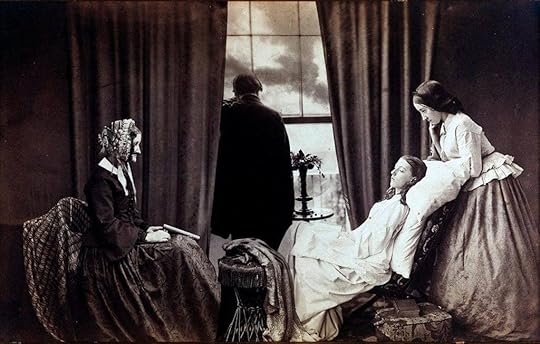Looking at Grief

Fading Away, Henry Peach Robinson
This post was inspired by an article in the New York Times: We Must Learn to Look at Grief by Sunita Puri, a palliative care physician.
The specific case: Dr. Puri tells the wife of a patient that her husband is dying from Covid19. He had guided her as she made medical decisions for her husband. Dr. Puri explained that her husband’s lungs were destroyed. All the woman responded was that she knew he would not want to suffer.
Puri writes: In the ICU the next day, she wasn’t allowed to be at his side, but was given permission to see him from the other side of his room’s sliding doors.
She stared at her husband, her slight frame swallowed by a billowing yellow PPE gown. She removed her latex gloves, pressed her palms against the glass, watched an RN push pain medicine into his vein. The respiratory therapist removed her husband’s breathing tube in one graceful arc. My patient’s wife pressed harder against the glass, inched closer. Her husband took shallow breaths for a few minutes, and then was still. The wife dropped her head, folding like paper curling toward the fire that consumes it. The imprint of her palms remained on the glass door.
THE WORDS OF A COMPASSIONATE PHYSICIAN
In the interview, Dr. Puri states that it is natural and possibly instinctive to want to look away from death, to deny its existence or banish it to a shadow world. But, it can also be an opportunity to examine, rather than bury grief–especially if it belongs to us. Dr. Puri emphasizes that bearing witness to death and pain is the only way we can move forward. The patient’s wife showed Dr. Puri photos of the life she and her husband had together. She wanted to know the numbers, the percentage of patients who HAD SURVIVED.
Dr. Puri writes that early in his career, he tried to distract himself from the pain of his career by watching S.N.L. marathons or by eating chocolate cake. He tells us: Eventually, I realized it wasn’t my job to protect people from their grief or to solve it….The prelude to compassion is the willingness to see.
He stresses: One week before her husband died, my patient’s wife called to ask me how she could possibly move on with her life in a world where her husband didn’t exist. I don’t believe in “moving on” and “finding closure”, she told him… The challenge for my patients and their families is the challenge for every human: Can we move forward with grief? Can we find a way to integrate loss into life, carry it with us?
At the end of his essay, Dr. Puri reminds us that grief has affected everyone around us. Sometimes we feel discomfort when seeing others in pain, especially when we cannot intervene…He writes: Our country can still be united by seeing this suffering. WE ARE ALL MY PATIENT AND WE ARE ALL HIS WIFE. ..It is one lens through which we can see our shared humanity.
SHE HEARD THE NEWSPAPER FALL
A few weeks ago, when I finished reading this moving piece, I wrote at the bottom of the page: Concerning my father’s death, my mother had always told us that she knew he’d died in the next room, because, “She heard the newspaper fall.”
My father wasn’t in an ICU. He was reading the Chicago Tribune, sitting in his favorite chair in our living room. My mother was making formula for my 3 month old brother. My older brother and I were a few miles away, at my grandmother’s. My father had been having chest pain for months. SHE HEARD THE NEWSPAPER FALL. Massive coronary.
Dr. Puri knows that if we are able to look at our grief, and thus the grief of others, we will improve the human condition. All of us will eventually die. In the meantime, we should never deny the existence of an illness that is killing so many. We must support the medical community which also includes the wives and husbands, children and relatives of the suffering. One day for each of us, WE WILL HEAR THE NEWSPAPER FALL.
PS. This post was written before Russia attacked Ukraine. Now, once again our lives have changed. It is impossible for any one of us to ignore the deaths of innocent people. There was Covid and now there is war. We have been here before, our parents have been here before. Final thought: love your family; listen to your friends; follow Covid protocols if the virus and its mutations are still active where you live. And pray for peace, pray for Ukraine, give what you can, in anyway you can. Understand those who are grieving. Everyone of us will have grief in our lives, it’s our human condition. Thanks for reading.
Thanks to “We Must Learn to Look At Grief ” Opinion, Sunita Puri MD, palliative care physician, author of THAT GOOD NIGHT: LIFE and MEDICINE IN THE ELEVENTH HOUR
photo art: Henry Peach Robinson
Facebook Twitter LinkedInPinterest


